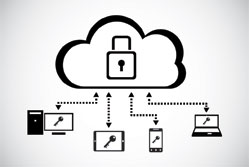How managed security software can keep you safe
How managed security software can keep you safe
 Earlier this year, hundreds of thousands of websites were affected by the heartbleed security flaw.
Earlier this year, hundreds of thousands of websites were affected by the heartbleed security flaw.
Heartbleed was a massive headache, but also acted as a reminder that large-scale security breaches can — and do — happen.
It’s not just down to IT staff and security experts to take action. Business owners have a role to play, too.
There are many things you can do to protect your business from online threats. The security section of IT Donut is an excellent place to start.
One of the most important things to think about is anti-virus and security software. These programs scan your computers for viruses, spyware and other malware. They also monitor your network for suspicious activity, and can identify and remove email threats.
Just a single piece of malware can leave your systems wide open, paving the way for hackers to enter and steal your data. Security software is a key countermeasure.
Finding the right security software
It’s easy to realise that you need security software. But there’s a bewildering choice of options, making it actually quite hard to pick one that meets your needs and budget.
And even when you’ve chosen your security software, just having it isn’t enough. In order for it to be effective, it needs to be:
- Installed on every computer and server you have
- Kept up to date, with details of all the latest threats
- Turned on and set to perform regular scans
If you don’t meet these three requirements, your company will be at risk of a malware attack and data breach.
What do your users do?
Got all that sorted? Great. The next things you have to worry about are user habits.
Security software is only effective if it’s running on all your computers at all times. Unfortunately, it can sometimes slow computers down, block other software or force you to wait while it performs a scan.
For these reasons, you might find that your employees close the security software on their computers, disable the scanning functions, cancel updates — or change settings in some other way that makes the software less effective.
It’s easy to get overwhelmed by the job of making sure your security software is running properly and checking your employees haven’t interfered with its settings.
And that’s where managed anti-virus and security software comes in.
What is managed security software?
Managed security software works much the same as other security packages. It helps keep your systems secure and free of malware.
The main difference is that the software is managed by someone else. This is usually done by an IT provider (like your IT support company), but can be done by someone in your business, if you have the expertise in-house.
Whoever manages the security software takes responsibility for ensuring the solution is installed on every system and is always kept up to date.
Usually, software on individual computers and servers will be managed from a central control panel. For instance, changes to settings and updates can be rolled out across all computers automatically.
This is great for many smaller businesses because it means they don’t need to worry about the installation or day-to-day management of security software.
If you adopt managed security software, it can give you the benefit of knowing your systems and data stored are secure, without having to get into the ins and outs of checking every computer and every setting yourself.
- How to choose security and anti-virus software
- Security software FAQ
- How to perform an IT security risk assessment
(c) Mirus IT, provider of managed security software to smaller companies.




Comments
Add a comment